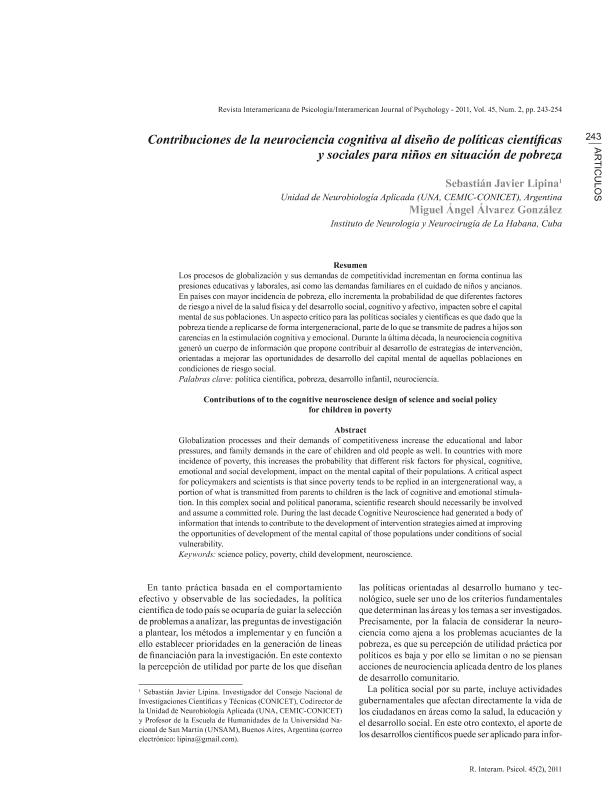Mostrar el registro sencillo del ítem
dc.contributor.author
Lipina, Sebastián Javier

dc.contributor.author
Álvarez González, Miguel Ángel

dc.date.available
2023-04-18T19:02:16Z
dc.date.issued
2011-12
dc.identifier.citation
Lipina, Sebastián Javier; Álvarez González, Miguel Ángel; Contribuciones de la neurociencia cognitiva al diseño de políticas científicas y sociales para niños en situación de pobreza; Progress of Neuro-Psychopharmacology and Biological Psychiatry; Revista Interamericana de Psicología; 45; 2; 12-2011; 243-253
dc.identifier.issn
0034-9690
dc.identifier.uri
http://hdl.handle.net/11336/194404
dc.description.abstract
Los procesos de globalización y sus demandas de competitividad incrementan en forma continua las presiones educativas y laborales, así como las demandas familiares en el cuidado de niños y ancianos. En países con mayor incidencia de pobreza, ello incrementa la probabilidad de que diferentes factores de riesgo a nivel de la salud física y del desarrollo social, cognitivo y afectivo, impacten sobre el estado de bienestar y el capital mental de sus poblaciones. Un aspecto crítico para las políticas sociales y científicas es que dado que la pobreza tiende a replicarse de forma intergeneracional, parte de lo que se transmite de padres a hijos son carencias en la estimulación cognitiva y emocional. La implicancia directa de ello es que tales comunidades van perdiendo su capital mental y la fuerza impulsora de su desarrollo social. En este complejo panorama social y político, la investigación científica necesariamente debe involucrarse y asumir un rol comprometido. Durante la última década la Neurociencia Cognitiva generó un cuerpo de información que propone contribuir al desarrollo de estrategias de intervención orientadas a mejorar las oportunidades de desarrollo del capital mental de aquellas poblaciones en condiciones de riesgo social.
dc.description.abstract
Globalization processes and their demands of competitiveness increase the educational and labor pressures, and family demands in the care of children and old people as well. In countries with more incidence of poverty, this increases the probability that different risk factors for physical, cognitive, emotional and social development, impact on the well-being status and the mental capital of their populations. A critical aspect for policymakers and scientists is that since poverty tends to be replied in an intergenerational way, a portion of what is transmitted from parents to children is the lack of cognitive and emotional stimulation. A direct implication is that such communities are at risk of losing their mental capital and the potentiality of their social development. In this complex social and political panorama, scientific research should necessarily be involved and assume a committed role. During the last decade Cognitive Neuroscience had generated a body of information that intends to contribute to the development of intervention strategies aimed at improving the opportunities of development of the mental capital of those populations under conditions of social vulnerability.
dc.format
application/pdf
dc.language.iso
spa
dc.publisher
Progress of Neuro-Psychopharmacology and Biological Psychiatry

dc.rights
info:eu-repo/semantics/openAccess
dc.rights.uri
https://creativecommons.org/licenses/by-nc-sa/2.5/ar/
dc.subject
NEUROCIENCIA COGNITIVA
dc.subject
POBREZA INFANTIL
dc.subject
POLÍTICA PÚBLICA
dc.subject
INTERVENCIONES
dc.subject.classification
Otras Psicología

dc.subject.classification
Psicología

dc.subject.classification
CIENCIAS SOCIALES

dc.title
Contribuciones de la neurociencia cognitiva al diseño de políticas científicas y sociales para niños en situación de pobreza
dc.title
Contributions of to the cognitive neuroscience design of science and social policy for children in poverty
dc.type
info:eu-repo/semantics/article
dc.type
info:ar-repo/semantics/artículo
dc.type
info:eu-repo/semantics/publishedVersion
dc.date.updated
2023-04-17T13:48:58Z
dc.journal.volume
45
dc.journal.number
2
dc.journal.pagination
243-253
dc.journal.pais
Estados Unidos

dc.journal.ciudad
Gainsville
dc.description.fil
Fil: Lipina, Sebastián Javier. Centro de Educación Médica e Investigaciones Clínicas "Norberto Quirno"; Argentina. Consejo Nacional de Investigaciones Científicas y Técnicas; Argentina
dc.description.fil
Fil: Álvarez González, Miguel Ángel. Universidad de La Habana; Cuba
dc.journal.title
Revista Interamericana de Psicología

dc.relation.alternativeid
info:eu-repo/semantics/altIdentifier/url/https://dialnet.unirioja.es/servlet/articulo?codigo=5378699
Archivos asociados
